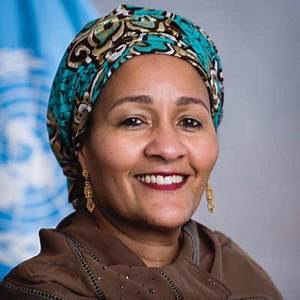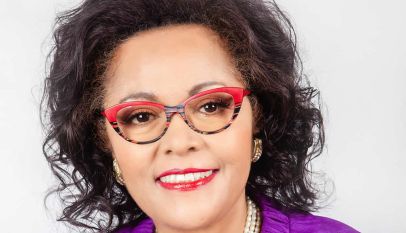UN report: Financial systems must change or SDGs will fail
The 2019 “Financing for Sustainable Development Report,” a project of more than 60 agencies in the U.N. system along with partner organizations, sounds the alarm and outlines some recommendations for a path forward.

If national and international financial systems don’t change, the Sustainable Development Goals will not be achieved, according to a new report out from the United Nations on Thursday. “The world cannot achieve the SDGs without a fundamental shift in the international financial system to address urgent global threats,” U.N. Deputy Secretary-General Amina Mohammed said in a press conference Thursday.
The 2019 “Financing for Sustainable Development Report,” a project of more than 60 agencies in the U.N. system along with partner organizations, sounds the alarm and outlines some recommendations for a path forward.
Despite some progress on poverty reduction, the picture the report paints is bleak. World economic growth is holding at about 3 percent and unlikely to rise, seven times more dollars’ worth of goods are subject to trade restrictions compared to a year ago, and about 30 least-developed or vulnerable countries are in, or at high risk of, debt distress.
“Achieving sustainable development requires multilateral action to address global challenges; revisiting the global institutional architecture; and strengthened regional and national action, including adjusting policies to the changing global landscape,” according to the report.
Here are five key takeaways from the report about what needs to be done:
1. The multilateral system is under strain in a rapidly changing global environment. While this poses a challenge, it also “opens the door” to ensure that multilateral institutions are “fit for purpose,” Mohammed said. They need to adapt and reform. “Rather than retreating, we must strengthen collective action in support of sustainable development,” she said.
2. There needs to be a remaking of global financial architecture — from sovereign debt, to international tax norms, to the international trade system. With so many countries facing debt challenges, new instruments and nontraditional creditors have created gaps in the current systems. As reforms to debt reduction are discussed, they should consider whether debt restructuring or reduction programs can be tied to future social sector spending that less debt can unlock, Mohammed said. An increase of digitalization has also raised questions about how changes to the global tax system could be changed to address inequities.
3. Countries need to take action on the national level to create national financing frameworks that support their national development plans. These frameworks were introduced at the Addis Ababa financing summit, but it’s time to start creating and using them, Mohammed said.
A customer receives money form teller inside a bank in Khartoum, Sudan. Photo by: REUTERS / Mohamed Nureldin Abdallah
WASHINGTON — If national and international financial systems don’t change, the Sustainable Development Goals will not be achieved, according to a new report out from the United Nations on Thursday.
“The world cannot achieve the SDGs without a fundamental shift in the international financial system to address urgent global threats,” U.N. Deputy Secretary-General Amina Mohammed said in a press conference Thursday.
The 2019 “Financing for Sustainable Development Report,” a project of more than 60 agencies in the U.N. system along with partner organizations, sounds the alarm and outlines some recommendations for a path forward.
Despite some progress on poverty reduction, the picture the report paints is bleak. World economic growth is holding at about 3 percent and unlikely to rise, seven times more dollars’ worth of goods are subject to trade restrictions compared to a year ago, and about 30 least-developed or vulnerable countries are in, or at high risk of, debt distress.
“Achieving sustainable development requires multilateral action to address global challenges; revisiting the global institutional architecture; and strengthened regional and national action, including adjusting policies to the changing global landscape,” according to the report.
Here are five key takeaways from the report about what needs to be done:
1. The multilateral system is under strain in a rapidly changing global environment. While this poses a challenge, it also “opens the door” to ensure that multilateral institutions are “fit for purpose,” Mohammed said. They need to adapt and reform. “Rather than retreating, we must strengthen collective action in support of sustainable development,” she said.
2. There needs to be a remaking of global financial architecture — from sovereign debt, to international tax norms, to the international trade system. With so many countries facing debt challenges, new instruments and nontraditional creditors have created gaps in the current systems. As reforms to debt reduction are discussed, they should consider whether debt restructuring or reduction programs can be tied to future social sector spending that less debt can unlock, Mohammed said. An increase of digitalization has also raised questions about how changes to the global tax system could be changed to address inequities.
3. Countries need to take action on the national level to create national financing frameworks that support their national development plans. These frameworks were introduced at the Addis Ababa financing summit, but it’s time to start creating and using them, Mohammed said.
4. Success on the global goals will require a shift to a more long-term way of thinking by all involved, including the private sector, where incentives and regulations encourage short-term oriented behavior. Investors and businesses will have to make sustainability a central part of investment decisions, and public and private incentives need to be aligned to ensure sustainable development, according to the report.
5. Innovation and new technologies offer great potential for development finance, but it also prevents risks and needs to be properly managed. There needs to be a new focus on the regulatory frameworks needed to address risks from technology, Mohammed said.
In order to achieve these objectives, more partnerships are needed and current efforts must scale, she said, adding that it will require a collective response.
Many of today’s challenges cross borders; countries can’t deal with migration or climate change or cross-border conflict alone, and the U.N. will continue to make the argument that it is important to sit down and find solutions together, Mohammed said. And where there are strong regional institutions, the U.N. needs to collaborate more with them than they have in the past, she added.
“I think what we’re asking now is how much clearer can we be with the value proposition,” Mohammed said. “The implications of not investing will impact everyone.”
The U.N. can play a role in connecting the dots and better facilitating where flows could be directed and is working on being more fit for purpose but it is a complex set of challenges, she cautioned.
This article was originally published on Devex; it appeared on the digital media platform on April 05, 2019









